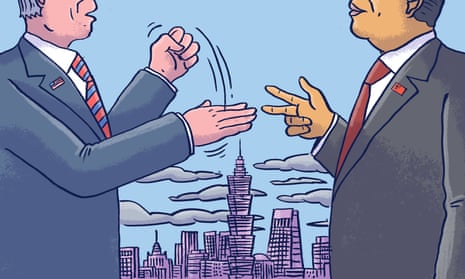The historic visit of the US House speaker, Nancy Pelosi, to Taiwan on Wednesday has certainly triggered a harsh response from China. The People’s Liberation Army (PLA) has been conducting a series of drills around the island that amount to a partial blockade of the Taiwan Strait. In addition, Beijing has announced sanctions against Taiwan, affecting goods from pineapple cakes (a Taiwanese delicacy) to oranges; it has also declared eight countermeasures in response to Pelosi’s visit, which included cancelling dialogues between the leaders of Chinese and US military theatres and suspending the joint Sino-US talks on climate change.
Tension in the Taiwan Strait has put the world on edge. The G7 foreign ministers last week called on China to “resolve cross-Strait differences by peaceful means”. However, there has also been much criticism of Pelosi. For instance, in the New York Times, Thomas Friedman characterised her visit as “utterly reckless, dangerous, and irresponsible”. For such critics, it could not have happened at a worse time: 1 August is PLA Day, a holiday celebrating the founding of the Chinese army.
Furthermore, the visit happened right before the Beidaihe conference – a secretive gathering of Chinese Communist party elites where major policy decisions are made – and the 20th CCP congress, where President Xi Jinping is widely believed to be pursuing an unprecedented third term. The timing thus made Pelosi’s visit highly provocative. Xi could hardly afford to lose face to the Americans at this critical juncture.
One implication of these criticisms is that the current tension could be defused after a few months. Once Beijing felt that it had sufficiently rebuked Pelosi and punished Taipei, the tension could subside.
We are not so optimistic. Pelosi’s visit was merely a trigger. The crisis reflects deeper issues in Sino-US relations. If they are not addressed, we expect more instability in the Taiwan Strait and the evolution of great power competition into great power conflict.
In the past few years, policymakers, opinion leaders and members of the public in China have increasingly compared America to a “paper tiger”. On the one hand, the US is believed to be pernicious. Jealously guarding its own hegemony, it does not and cannot accept China’s rise, they say; since the Trump administration, Washington has started to systematically hollow out the “one China principle” with the intention of using Taiwan as a pawn to contain China. On the other hand, Washington is believed to lack resolve and capabilities.
Although the US is malicious, it is also weak, runs the line. While China’s 1.4 billion citizens are united in their pursuit of the “Chinese dream”, America is plagued by internal contradictions ranging from partisan polarisation to racial tension. If the US did not send troops to Ukraine, surely it lacks the stomach to defend Taiwan? Notably, Hua Chunying, China’s foreign ministry spokesperson, was mocking America as a “paper tiger” on Twitter just days before Pelosi went to Taiwan.
This “paper tiger” line significantly complicates efforts to maintain stability across the Taiwan Strait. If Pelosi had decided to cancel her trip to Taiwan after Beijing’s protest, China would probably have launched a propaganda campaign ridiculing Washington’s claim that its commitment to Taiwan was “rock solid”. However, whenever the US tries to signal its resolve and capabilities, Beijing is likely to interpret this as evidence of hostility.
Washington is caught between Scylla and Charybdis. If the US attempts to reassure China, that risks looking like appeasement. If it signals its intention to defend the liberal international order in the Indo-Pacific, that could trigger an uncontrollable security dilemma.
In the context of this dynamic, can we be confident that Beijing would not have raised tensions at some later date even if Pelosi had not visited Taiwan? How would Beijing react were the US to sell Taiwan offensive weapon systems comparable to those that have been recently supplied to Ukraine? We might debate how provocative Pelosi’s visit would look in comparison with arms sales (some may perceive the former as a more overt challenge to Chinese sovereignty). But this very discussion draws attention to the underlying dynamic that makes US actions provocative to China.
Focusing on Pelosi’s visit distracts us from the deeper problems that plague Sino-US relations. Beijing needs to recognise how destabilising and counterproductive the “paper tiger” analogy is. It complicates any attempt to construct “guard rails” that would prevent US-China competition becoming US-China confrontation.
Beijing needs to stop suggesting that the US lacks the will to guard the liberal international order in the Indo-Pacific. Jeering at America’s resolve is not only dismissive and insulting but also counterproductive. Even if the US does lack resolve, taunting it serves only to fuel anti-China sentiments and force Washington to harden its position.
As Beijing’s view of Washington swings from contempt to anger, Washington needs to focus on de-escalation. On Thursday, the Biden administration delayed a long-planned intercontinental ballistic missile test in order to defuse tension with China. That was right. But the US should not cease expressing its support for Taiwan. On the contrary, it should take steps to signal its commitment to Taiwan by deepening bilateral trade and economic relations, which would have less risk of provoking Beijing. In short, dealing with China requires a firm yet soft touch.
